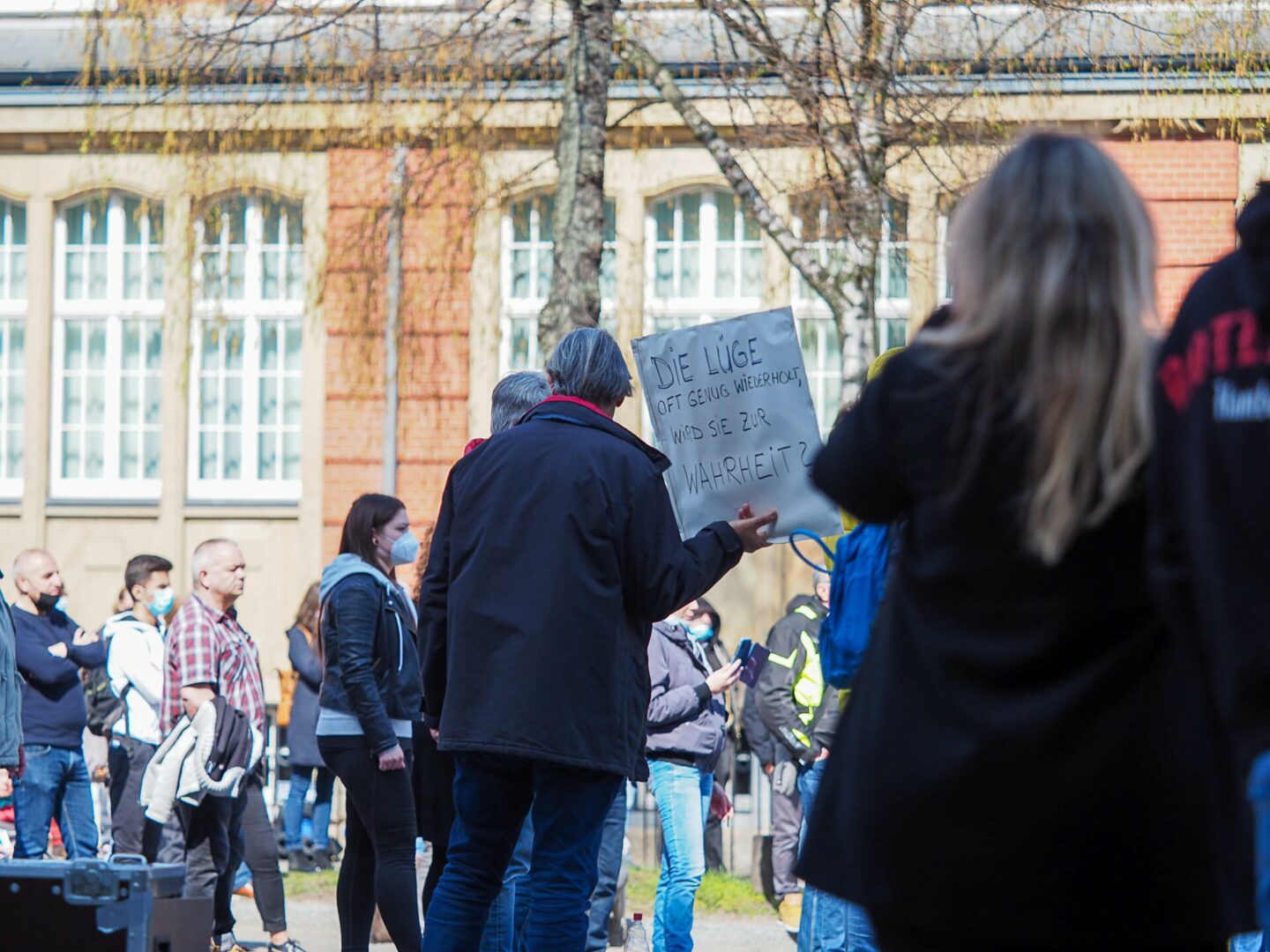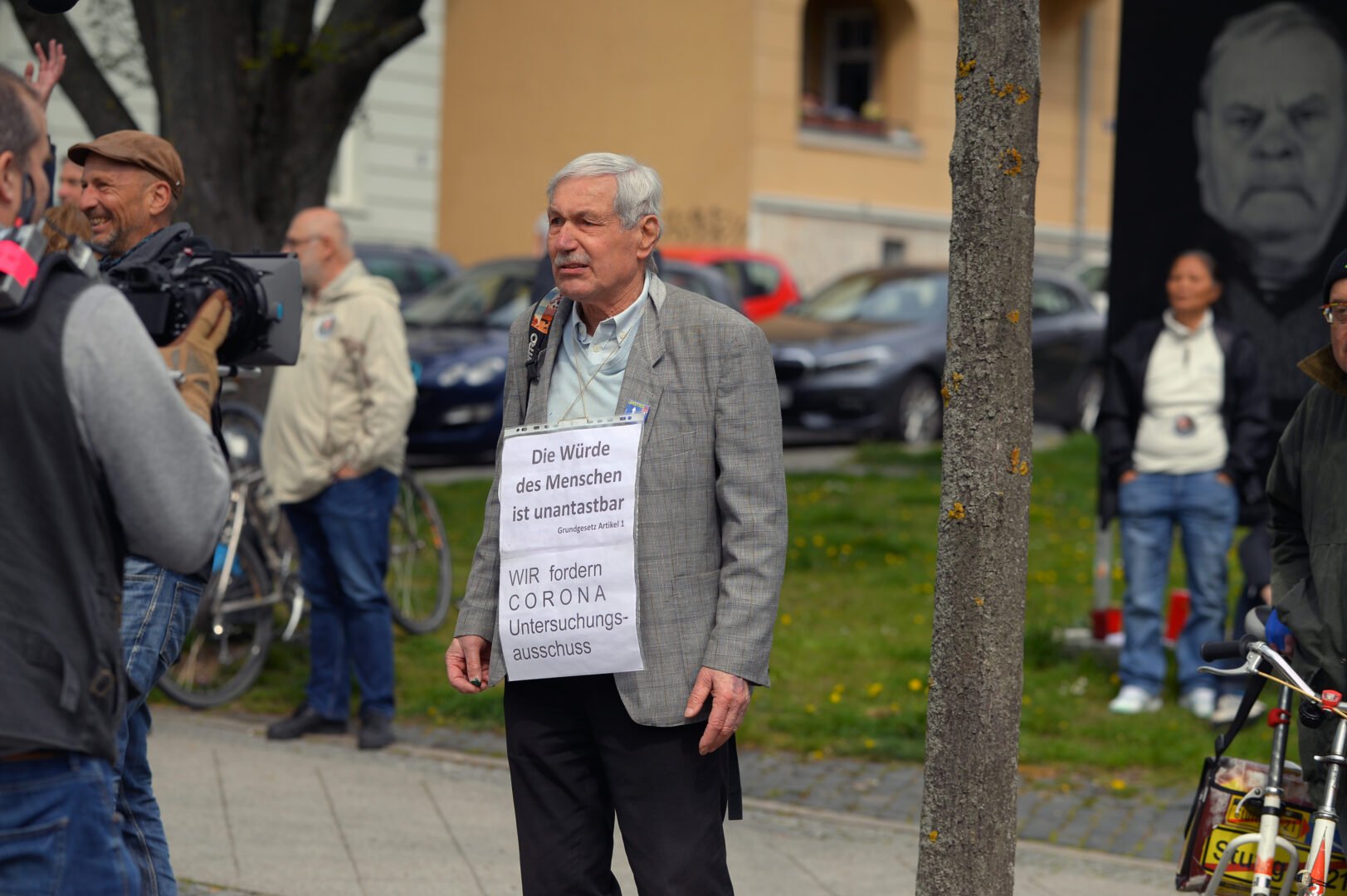by Lena Reiner und Niklas Golitschek
“Peace, freedom, democracy!” the people chant´walking through Stuttgart city centre. With whistles, the calls are loud, sometimes shrillly underscored; form and content differ widely here. People walk quickly, turn into a small street, use narrow passageways through buildings. Shortly afterwards, they walking into a police barrier. The march is interrupted, personal data are recorded, the mood is briefly aggressive.
It’s April 17th, nationwide protests with the slogan “It’s enough!” of the Querdenken movement are taking place. In Stuttgart, the demonstration is forbidden. The people who gather here at the place of origin of the movement cannot be deterred.
A diverse picture
At first glance, the Querdenken movement includes people from all political positions; of all age groups, occupational groups and realities of life. At second glance – and after analysis by Experts – it becomes clear: the followers of the movement are more united than in mere criticism of the Covid policy.
Beate Küpper, co-author of the Mitte-Studies (“Center-Studies”) of the Friedrich-Ebert-Foundation, says: “That’s the interesting thing: at first glance, Querdenken brings together a crazy mix of established citizens, esoteric and hard right-wing extremists and the hard-hitting conspiracy people.” At the same time, she sees connecting elements such as the national, which is partly found in both the anthroposophical and esoteric scene: “The idea of social darwinism is strongly found in appeals of Querdenken: those who do not eat well do not deserve to be protected.” The center-study also showed – “this can be proven” – that a belief in conspiracies often correlates with anti-Semitism or beliefs of infiltration by the Islam.
from: Verschwörungsmythen als Radikalisierungsbeschleuniger: Eine psychologische Betrachtung (April 2020) –Conspiracy Myths as a Radicalization Accelerator: A Psychological Observation (April 2020)
This is also how Sebastian Lipp, who documents parts of the movement for “Allgäu rechtsaußen” (“Allgäu on the far right”): “It’s very similar from the head to the base. It’s not like the heads are pulling in a direction, which people don’t want to go. In principle, this doesn’t take much.”
The political scientist Fabian Virchow and (co-)author of the study „Pandemie-Leugnung und extreme Rechte in Nordrhein-Westfalen” (“Pandemic Denial and Extreme Right in North Rhine-Westphalia” also sees similarities between the people he calls pandemic deniers.

Scene change to Hamburg: Anti-constitutional symbols are not present at the approved “It’s enough” demonstration at Rödingsmarkt. On the meeting area, which is open to 200 people, a calm mood emerges: Ballermann atmosphere with roars from the loudspeakers, 80’s evergreens, the call to remain peaceful. On the other side are pandemic denials about allegedly genetically modified vaccines, which would kill up to 30 percent of the elderly, and the demand and resist against the state.
Observation by the Federal Office for the Protection of the Constitution
The Dangerous Part
Lipp says: “Very hard Nazi things are now going through and are not commented negatively.”
Radical messages were not an isolated case at the demonstrations.
Virchow does not want to decide whether Querdenken can permanently gain access to the far-right scene, but “definitely” notes a habit of far-right statements.
During his visits to large-scale demonstrations, he mainly observed, tried to capture the atmosphere and wondered: “Do people bother with whether there are Nazis running around?” His conclusion: “At the protests in Berlin and Düsseldorf I saw two “Nazis out” banners.” However, it was unclear who is meant by Nazis and what demarcation is made. Is this directed against right-wing extremists in the ranks of the demonstrators – or representatives of the state like the Federal President, who has already been called a ‘fascist’ in the publications of the movement?
Lipp explains why this is so difficult with the arbitrary use of such terms in the recent months: “Then it is said: we are the anti-fascists. It is often seen that the words mean nothing or are relativized when radical right-wing content is shared. Then it is relativized that people are far-right.” As a result, terms are “dimmed” until they mean nothing at all and their followers can interpret what they want: “We observe this in general: that all terms are completely lost in context and are words that are shot out as they are needed.” As a result, the basis for a conversation is lost.
Querdenken and the belief of dictatorship
In Hamburg, this is also reflected in the speeches. There is open and loud talk that Germany would no longer be governed democratically. With the exception of Telegram, all channels would be censored. It is repeatedly said that Hamburg is no longer a “free Hanseatic city”. “We live in a dictatorship,” says the shocked tenor, which remains unchallenged. A few minutes later, a group pulls along the street and shouts “Resistance, Resistance!” – accompanied and protected by the police.
In Stuttgart, meanwhile, masks are worn that resemble a swastika that slipped down; a black coronavirus on a white background, framed in red.
Democracy means responsibility
In the interview, Küpper expresses the concern that a kind of “Pegida-comprehension” is developing. The Pegida movement became big during the migration after 2015 and protesters did not mind to walk along with Nazis. People could be released from responsibility too quickly, Küpper warns. She explains:
Part of a democracy is that if I want to be taken seriously as a mature citizen, then I also have responsibility for what I mean and do.
Prof. Dr. Beate Küpper, Social work in groups and conflict situations, Deputy Director of the Institute SO.CON, University of Applied Sciences Niederrhein
It is then too easy to say: people do not know better. “No, I have to open my eyes. And then I can see what kind of flag I stand next to and I can also see the hardcore right-wing extremists on the Querdenken protests and then you don’t have to stand with them.”
She also thinks it is too easy to see only those affected by the measures: “Many other people also have stress and do not go along with them. You can do other things than walking with Querdenken.” That’s where the responsibility begins:
- • Who do I unite with?
- z• Which stage do I put myself in front of?
- • Who do I give attention with it?
Previous observations have shown that this aspect is rather downplayed by those present; who do not want to face up to the responsibility. “In addition, there is the moment of self-appreciation through content: for peace and freedom – up to: ‘I’m squeeous to the Jewish star.’ More cynically, it’s hard to make yourself the victim of the worst crimes and derive self-righteousness and selfishness from it, to be on the side of the good,” Küpper says.
Staging as a victim

Virchow describes that he saw such yellow stars several times at the demonstrations: “There is a wide range of how to stage oneself, including historical comparisons with Anne Frank or Sophie Scholl.”
Just like at a forbidden demonstration in Weimar at the beginning of May, when pandemic deniers staged in front of the open-air exhibition “The Witnesses”, which shows Holocaust survivors.
The staging as a victim and the narrative are important:
It was remarkable for him, as at a demonstration in Berlin in the summer of 2020, when the police occupied the stage, the peaceful mood turned into total aggressiveness. “It has flipped incredibly fast,” Virchow observed. It was interesting to watch the participants: “They actually believe that they live in a dictatorship.” As a group of helmeted policemen walked through the line, the roar started: “Now they’re shooting right here.”
Discourse shift to the right
Lipp therefore warns against underestimating what is left of Querdenken later on. On the one hand, he cites the enormous wealth of experience that many people have been able to mobilize on certain issues. On the other hand, the structures of the extreme right and docked groups would be consolidated and expanded: “In this respect, even if Querdenken fails, an enormous potential remains that advances the far-right.” In addition, there is a shift in discourse towards topics from the (extreme) right and conspiracy-mythical spectrum, which has penetrated into the leading media: “It has been done now, it does not simply go away again.”
Virchow is more cautious here. He emphasizes: “At the Querdenken protests, even migrant people could move, that would not be possible at pure Nazi events.” There are also contradictions in the Querdenken movement. Roughly generalized, there are people who seek confrontation with the alleged dictatorship and tolerate Nazis. “But to become a nationalist is a different thing,” Virchow insists, without overlooking the interfaces. How the protest is composed in the respective regions should actually be explored: “We need a comprehensive observation in order to make reliable statements here.”
On the catch of votes in the Querdenken environment
Küpper also says: “We have both directions: how ordinary people can be absorbed. We also have active, strategic actors: those who use and fuel this purposefully. Who lay the tracks to pull you in.” The AfD, for example, is clearly trying to catch votes in the cross-thinking environment. Whether this will ultimately succeed, remains to be seen. In opinion polls, the AfD is currently below the 12.6 percent of the 2017 Bundestag election with around 11 percent.
Küpper, on the other hand, considers it unlikely that a general disaffection with politics leads to movements such as Querdenken. “There are other ways to get involved politically. The doors are open.” Similar to Pegida, it can be said positively: this is a renewed awakening of political participation; neutral and purely descriptive. Küpper, however, adds: “Democracy gives us more content, what is part of it – not pure political activity. To strive for dictatorship is also political participation, but not democratic. You have to look at the content: what do people stand for? It is only a win for democracy, if the content is also democratic.”
Obstacle to democratic participation
When looking at the contents of the Querdenken movement, it would clearly deny this democratic aspect. For what often comes from the gallery and is held up on posters – apart from “Peace, freedom, democracy!” as in Stuttgart – is not particularly democratic and does not do democracy any good either. On the contrary, she sees this as an obstacle to democratic participation: “This prevents a genuine democratic debate on different positions.”



